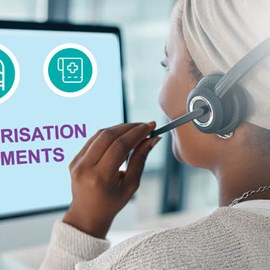
Pre-authorisation is a process medical schemes put in place to ensure that before you get expensive medical treatment, the scheme has checked you are a member of the ![]() scheme, you have the necessary benefits and that your treatment is cost-effective.
scheme, you have the necessary benefits and that your treatment is cost-effective.
Schemes specify which benefits are subject to pre-authorisation in the rules of the scheme.
As a member, you will typically need to get a pre-authorisation number from your scheme before:
In the case of emergency treatment, the hospital may seek pre-authorisation on your behalf or your family may be expected to obtain authorisation as soon as possible.
The purpose of a scheme requiring you to obtain pre-authorisation is to ensure that:
You are a member of the scheme and your membership has not been suspended or terminated;
![]() You have appropriate benefits available;
You have appropriate benefits available;
The provider is an accredited healthcare practitioner; and
The treatment is appropriate and cost-effective. For example, you may be required to try certain treatments for a condition without success before you will be allowed benefits for surgery.
In order to grant pre-authorisation, the scheme will typically require:
The name and practice number of the treating provider;
The name and practice number of the healthcare facility;
The ICD10 code for your diagnosis;
The codes for the procedures the healthcare provider will perform; and
The date/s on which you will be treated.
![]()
If you call your scheme’s administrator or managed care provider to obtain a pre-authorisation number, you may receive it verbally but it should be followed up with written confirmation. The written confirmation should include:
The authorisation number;
The procedures that were approved;
The date for which treatment was approved;
The healthcare provider that was approved to deliver the treatment / procedure;
The facility at which treatment was approved;
Any exclusions on your cover that could result in a shortfall in payment by your scheme;
Any benefit limits that could result in a shortfall in payment by your scheme;
The scheme rate for any treatment and whether your provider may charge more than the rate at which your scheme will reimburse resulting in a shortfall;
Whether you are required to use your scheme’s network and whether any provider or facility you are using is not part of that network which could result in a payment shortfall or co-payment;
Any further information you will be required to submit before the scheme will make payment.
Members often mistakenly believe that pre-authorisation means their claims will all be paid in full. It does not.
Ideally, your scheme should inform you when you seek pre-authorisation whether:
During any procedure or treatment, your condition or treatment requirements may change which may result in you needing to get additional authorisation. When you are in hospital, your case is typically managed by a hospital case manager who obtains authorisation from your medical scheme on your behalf.
After your treatment, the Council for Medical Schemes says your scheme should reconcile the authorisation, the payment instruction received by the scheme from the managed care organisation or the administrator, and the claims payment, so that if the claim is not paid in full, the scheme can explain to you:
If pre-authorisation is denied, you can appeal to the medical scheme to reconsider.
The pre-authorisation letter from your scheme should explain how you can appeal against the decision by your scheme’s administrator or managed care entity on how much of your claim to pay.
![]() If you are still unhappy with the outcome after you have appealed to the scheme, you can appeal to the Council for Medical Schemes. Find out how: Where to complain
If you are still unhappy with the outcome after you have appealed to the scheme, you can appeal to the Council for Medical Schemes. Find out how: Where to complain
Your scheme should also inform you how to apply for an ex-gratia payment.
The information in this article was sourced from a Council for Medical Schemes presentation on pre-authorisation.
